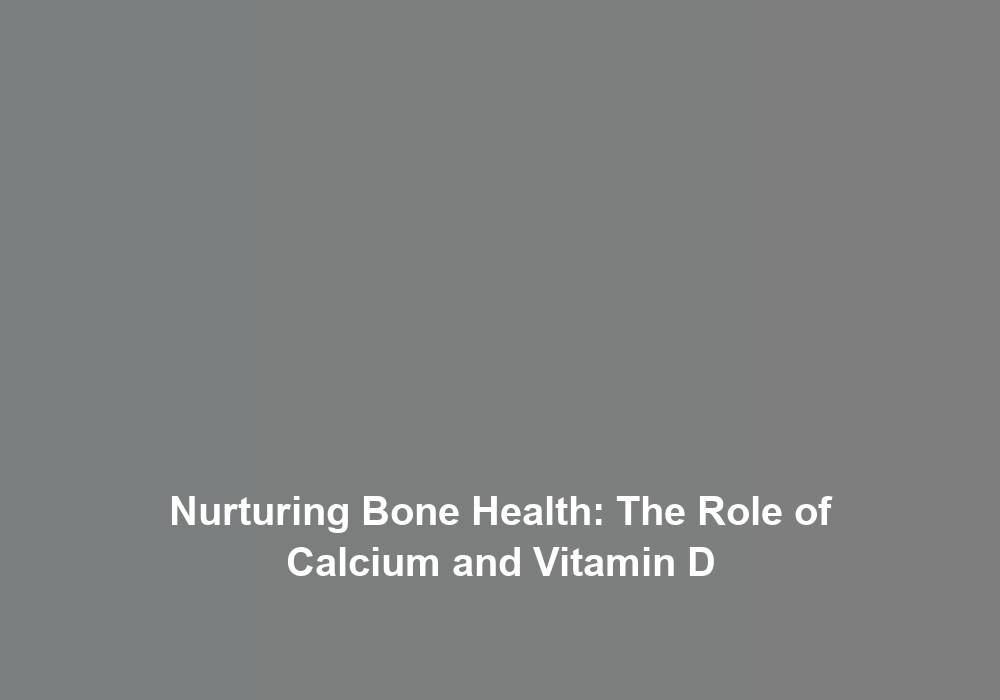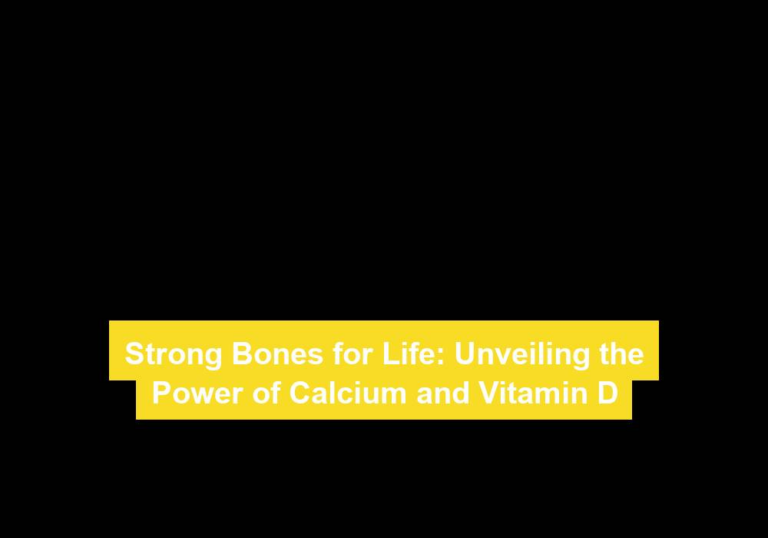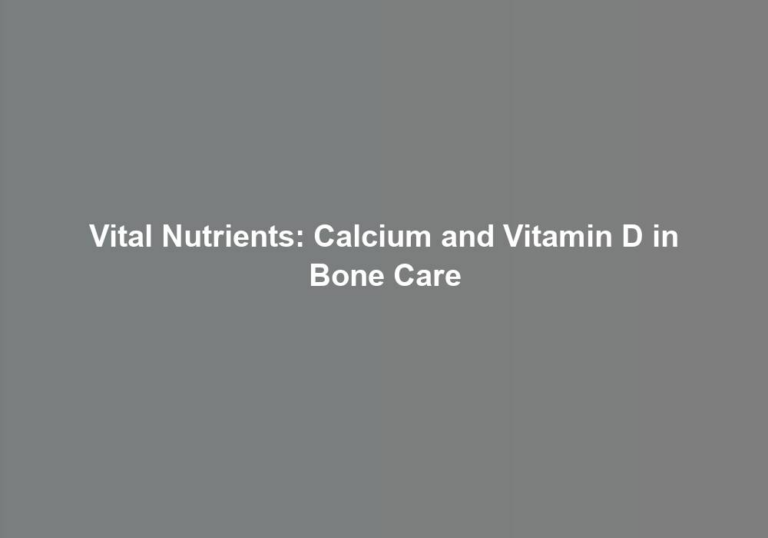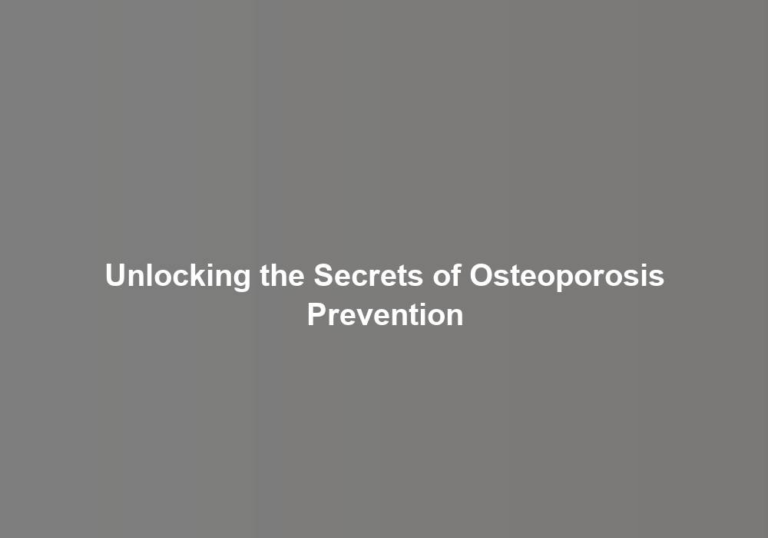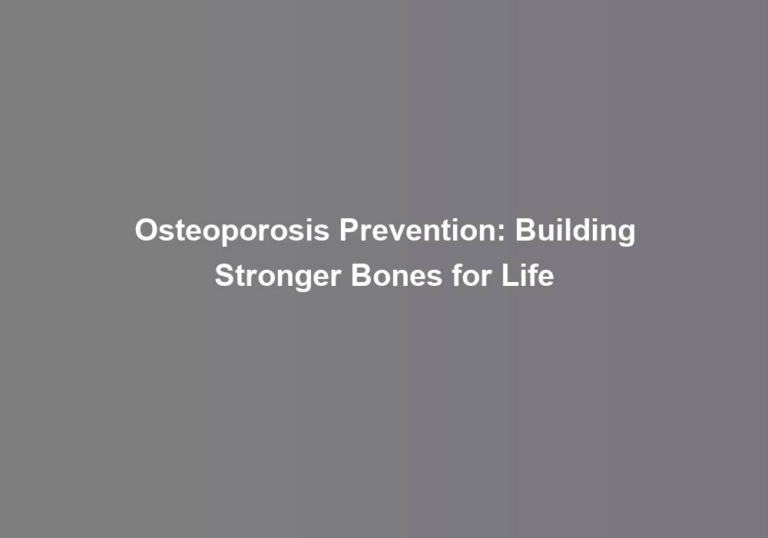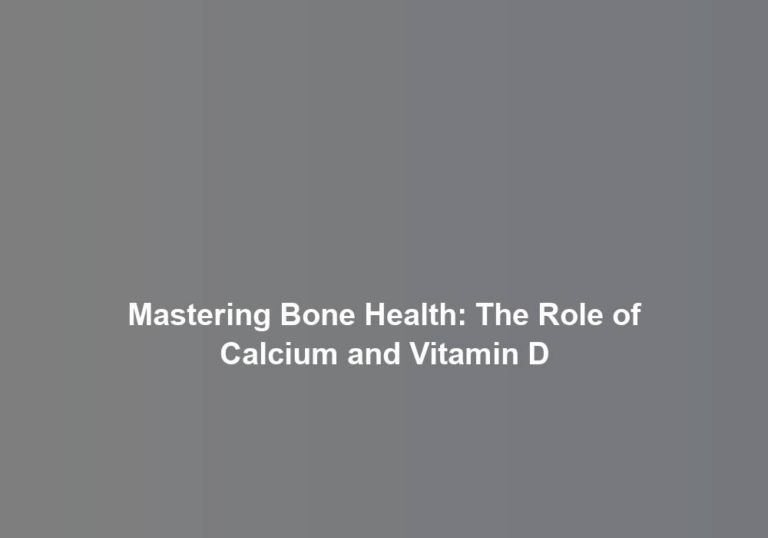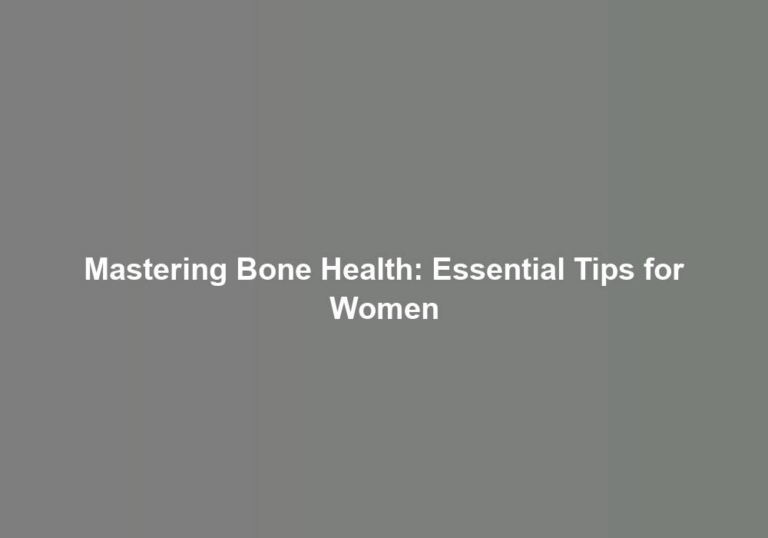Nurturing Bone Health: The Role of Calcium and Vitamin D
Are you taking the necessary steps to ensure the health and strength of your bones as you age? Understanding the role of calcium and vitamin D in bone health is crucial for maintaining strong and healthy bones throughout your life. From the recommended daily intake to the sources of these essential nutrients, there are various factors to consider. LetG??s explore the significance of calcium and vitamin D and how they contribute to overall bone health, as well as the potential need for supplements and other important considerations in nurturing your bone health.
Importance of Calcium and Vitamin D
To maintain strong and healthy bones, it is essential to ensure an adequate intake of calcium and vitamin D through a balanced diet and, if necessary, supplementation. Calcium is a vital mineral that the body needs for numerous functions, with bone health being one of the most crucial. It plays a key role in building and maintaining strong bones, and itG??s equally important for other bodily functions such as muscle contractions and nerve signaling. Incorporating calcium-rich foods into your diet, such as dairy products, leafy greens, and fortified foods, is essential for meeting your dietary requirements.
Additionally, vitamin D is necessary for the body to effectively absorb calcium. It promotes bone mineralization and helps maintain adequate levels of calcium and phosphate in the bloodstream. The health benefits of vitamin D extend beyond bone health, as it also supports immune function, reduces inflammation, and may even play a role in mood regulation. Exposure to sunlight is a natural way for the body to produce vitamin D, but it can also be obtained through certain foods and supplements.
Understanding the dietary requirements for calcium and vitamin D is fundamental for anyone seeking to prioritize their bone health. By consuming a well-rounded diet that includes these essential nutrients, you can reap the health benefits of strong bones and overall well-being. If you have specific concerns about your bone health, itG??s advisable to consult with a healthcare professional to determine if supplementation is necessary.
Recommended Daily Intake
Ensuring an adequate daily intake of calcium and vitamin D is crucial for maintaining optimal bone health and overall well-being. Both nutrients play a vital role in bone formation, maintenance, and preventing conditions such as osteoporosis. The recommended dietary allowances vary depending on age, sex, and life stage, so itG??s important to be aware of your specific requirements.
HereG??s a simple breakdown of the recommended daily intakes for calcium and vitamin D:
| Age Group | Calcium (mg/day) | Vitamin D (IU/day) |
|---|---|---|
| 0-6 months | 200 | 400 |
| 7-12 months | 260 | 400 |
| 1-3 years | 700 | 600 |
| 4-8 years | 1,000 | 600 |
This table provides a general guideline, but individual needs may vary based on factors such as pregnancy, lactation, and certain medical conditions. ItG??s essential to consult with a healthcare professional to determine the appropriate intake for your specific circumstances.
Calcium absorption is influenced by several factors, including age, vitamin D levels, and overall diet. Consuming an adequate amount of vitamin D is crucial as it enhances calcium absorption in the gut. Additionally, incorporating vitamin D-rich foods such as fatty fish, egg yolks, and fortified dairy products into your diet can contribute to meeting your dietary requirements.
Sources of Calcium and Vitamin D
Considering the importance of maintaining optimal bone health through adequate intake of calcium and vitamin D, understanding the sources of these essential nutrients becomes crucial in ensuring a well-rounded approach to meeting your dietary requirements. LetG??s delve into the dietary sources and absorption process of calcium and vitamin D.
Dietary sources of calcium include dairy products such as milk, cheese, and yogurt. Additionally, leafy green vegetables like kale and broccoli, as well as fortified foods like orange juice and cereals, are excellent sources of calcium. For those who are lactose intolerant or vegan, calcium-fortified plant-based milk alternatives, tofu, and almonds can also contribute to your calcium intake.
Vitamin D, often referred to as the G??sunshine vitamin,G?? is naturally produced in the skin when it is exposed to sunlight. However, it can also be obtained from dietary sources such as fatty fish (salmon, mackerel, and tuna), egg yolks, and fortified foods including milk, orange juice, and cereals.
The absorption process of calcium and vitamin D is interdependent. Vitamin D aids in the absorption of calcium from the intestines into the bloodstream, ensuring that the body can utilize the calcium obtained from dietary sources effectively. Therefore, itG??s important to ensure an adequate intake of both nutrients for optimal bone health.
Incorporating these dietary sources into your meals and snacks can help you meet your calcium and vitamin D requirements. Additionally, spending time outdoors to allow for natural sunlight exposure can further support your vitamin D intake. By being mindful of these sources and the absorption process, you can take proactive steps towards nurturing your bone health.
Role in Bone Health
You can optimize your bone health by understanding the crucial role that calcium and vitamin D play in maintaining strong and healthy bones. Both nutrients are essential for bone density and maintaining optimal bone health throughout your life. HereG??s how calcium and vitamin D support your bone health:
-
Bone Density: Calcium is a key component of bone tissue, contributing to bone strength and density. Adequate calcium intake helps prevent the loss of bone density, reducing the risk of fractures and osteoporosis, especially as you age.
-
Vitamin D Absorption: Vitamin D is essential for the absorption of calcium in the body. It helps regulate calcium and maintain the balance of minerals in your bones. Without sufficient vitamin D, your body may struggle to absorb the necessary calcium, leading to weakened bones.
-
Nutritional Balance: Achieving the right balance of calcium and vitamin D is crucial for maintaining bone health. While calcium is important for bone structure, vitamin D aids in its absorption, making them a powerful duo in promoting strong and healthy bones.
-
Lifestyle Impact: Factors such as regular weight-bearing exercise and avoiding smoking and excessive alcohol consumption also play a significant role in maintaining bone health. These lifestyle choices, when combined with adequate calcium and vitamin D intake, contribute to overall bone health.
-
Preventive Measures: Ensuring that you get enough calcium and vitamin D from your diet or supplements, as well as spending time outdoors for natural vitamin D synthesis, can help prevent bone-related issues in the long run.
Understanding the role of calcium and vitamin D in bone health and taking proactive steps to maintain a nutritional balance can significantly contribute to the strength and resilience of your bones.
Supplements and Considerations
When considering supplements for bone health, itG??s important to assess your individual dietary intake and potential deficiencies before making any decisions. While calcium and vitamin D supplements can be beneficial for bone health, itG??s essential to understand their effectiveness, dosage recommendations, as well as potential side effects and contraindications.
Calcium supplements can be effective in meeting daily calcium requirements, especially for individuals who struggle to obtain enough calcium from their diet. The recommended daily intake of calcium varies with age and gender, but generally ranges from 1000-1300 mg per day for adults. ItG??s crucial to consider your dietary calcium intake when determining the appropriate dosage to supplement.
Vitamin D supplements play a critical role in calcium absorption and bone health. The recommended daily allowance for vitamin D is 600-800 IU for most adults. However, individuals with deficiencies or specific health conditions may require higher doses under medical supervision.
Potential side effects of calcium supplements may include constipation and kidney stones, particularly when taken in excessive amounts. Similarly, excessive vitamin D supplementation can lead to toxicity, causing symptoms such as nausea, weakness, and kidney damage. ItG??s important to discuss with a healthcare professional before starting any new supplements, especially if you have underlying health conditions or are taking medications, as certain supplements may have contraindications.
Always aim to obtain nutrients from a balanced diet, and use supplements as a complementary approach based on individual needs and expert guidance.
Conclusion
So, remember, calcium and vitamin D are like the dynamic duo for your bone health. They work together to build strong, sturdy bones, just like bricks and mortar create a solid foundation for a building. Make sure to get your recommended daily intake from a variety of sources, and consider supplements if needed. Your bones will thank you for the support!

